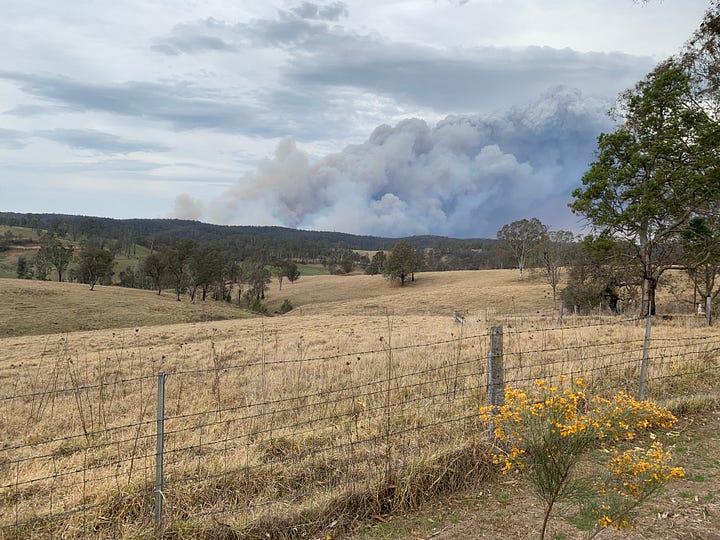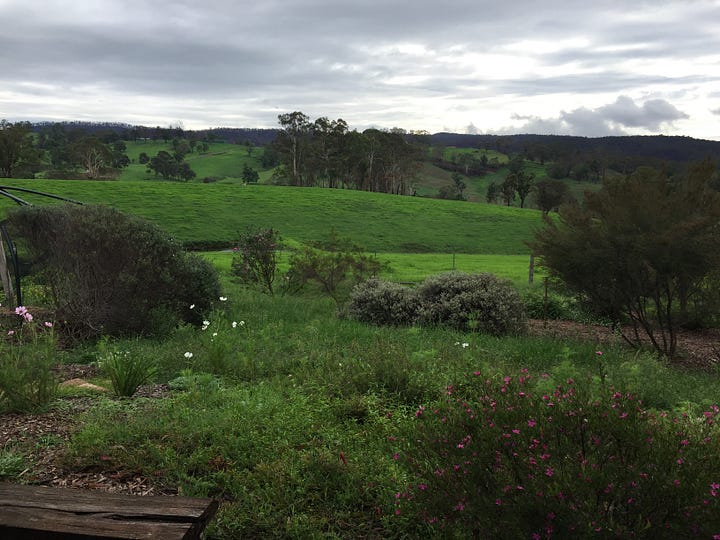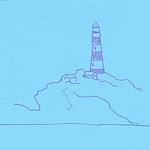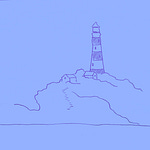Hello friends!
I hope you’re all travelling along well with To the Lighthouse. You have one more week to finish ‘The Window’ which is the first of three parts in the novel.
Today, as promised, I’m bringing you a conversation I recorded with
and . The conversation is about Leslie Stephen (Virginia Woolf’s father) and Mr Ramsay (the fictional version of Leslie Stephen in To the Lighthouse).In our conversation, we discuss the character of Mr Ramsay, focusing on the early chapters up until the end of Chapter 7 – so if you’ve read up to there, you will be well-equipped to follow along with our chat. I’d like to thank Ronald and Nancy both very much – they were wonderful interlocuters and we had fun. (Ronald would like to apologise for his creaky chair – it was keen to participate in the conversation as well, it seems!) (Also! we refer to ‘Vanessa’ a few times, possibly without properly explaining ourselves – we mean Vanessa Bell, Virginia Woolf’s sister.)
Some notes and references to accompany the conversation follow…1
Notes to accompany the conversation
Mr Ramsay in the early chapters of the novel
In the early chapters of To the Lighthouse we encounter Mr Ramsay correcting his wife about the possibility of going to the lighthouse, and then carrying on in a rather erratic manner, walking about the terrace and garden reciting lines of poetry and feeling agitated. Mr Ramsay is, we find out, sensitive about his legacy; will he be remembered as a great intellect or will he be forgotten? Mr Bankes (an old friend of Ramsay’s) and Lily Briscoe (and artist and friend of the family) discuss Mr Ramsay after he lurches past them. Mr Bankes finds it surprising that a man like Ramsay seems to rely so much on the praise of others. ‘Oh but,’ says Lily Briscoe, ‘think of his work!’
Mr Ramsay has written books of philosophy. Lily is only nominally aware of what they are about, so Mr Ramsay’s ‘work’ is somewhat obscure to her. But she feels that his brilliant mind, which must wrestle with complicated philosophical dilemmas, is a reason to indulge Ramsay’s eccentricities a little – he cannot be judged like an ordinary person.
After feeling acutely the inadequacy of his intellect (if knowledge were a scale from A to Z, he has probably only made it to Q, he thinks), Mr Ramsay goes to Mrs Ramsay to be reassured. He is like a deflated tyre; with quite a lot of effort, Mrs Ramsay pumps him back up and off he rolls.
The Charge of the Light Brigade
In the novel, Mr Ramsay repeats the line: ‘Someone had blundered.’ He also cries out: ‘Stormed at with shot and shell’ and soon bears down on Lily Briscoe, waving his hands about and shouting: ‘Boldly we rode and well.’
All of these are lines from the same poem: ‘The Charge of the Light Brigade’ by Alfred Lord Tennyson (although Mr Ramsay has changed ‘Boldly they rode and well’ to ‘Boldly we rode and well’). The poem, written in 1854, recounts the charge of the Light Brigade at the Battle of Balaclava during the Crimean War during which many in the Brigade lost their lives due to a miscommunication – a ‘blunder,’ so to speak. When Lily hears Mr Ramsay’s words as he lurches past, she observes wryly that he is riding off to die gloriously upon the heights of Balaclava (near the start of chapter 4), so clearly she understands the poetic reference, notwithstanding Mr Ramsay’s strange speech and behaviour.
Recitation of poetry
One thing we know from Virginia Woolf is that her father, Leslie Stephen, liked to recite poetry from memory and that this was a feature of their family life. Woolf has of course recreated this aspect of her father in the character of Mr Ramsay.
In the conversation with Ronald and Nancy, I read a short excerpt of one of Woolf’s accounts of her father. Here is the excerpt in a slightly longer form (which appeared in Frederic W. Maitland’s The Life and Letters of Leslie Stephen published in 1906):
His memory for poetry was wonderful; he could absorb a poem that he liked almost unconsciously from a single reading, and it amused him to discover what odd fragments and often quite second-rate pieces had ‘stuck’ to him, as he said, in this way. He had long ago acquired all the most famous poems of Wordsworth, Tennyson, Keats, and Matthew Arnold, among moderns. Milton of old writers was the one he knew best; he specially loved the ‘Ode on the Nativity,’ which he said to us regularly on Christmas night. This was indeed the last poem he tried to say on the Christmas night before he died; he remembered the words, but was then too weak to speak them.
He very much disliked reading poems from a book, and if he could not speak from memory he generally refused to recite at all. His recitation, or whatever it may be called, gained immensely from this fact, for as he lay back in his chair and spoke the beautiful words with closed eyes, we felt that he was speaking not merely the words of Tennyson or Wordsworth but what he himself felt and knew. Thus many of the great English poems now seem to me inseparable from my father; I hear in them not only in his voice, but in some sort his teaching and belief.
Philosophy and the invisible table
When Lily Briscoe thinks of Mr Ramsay’s philosophical work, she thinks of a kitchen table. The reason Lily thinks of a table is because previously when she asked Andrew (one of the Ramsay sons) what his father’s books were about, Andrew replied: ‘Subject and object and the nature of reality.’ And when Lily had said she didn’t know what that meant, Andrew added: ‘Think of a kitchen table then when you’re not there.’
When Ronald, Nancy and I discussed the kitchen table as it appears in the novel, I mentioned that this table was, in fact, a feature of Leslie Stephen’s philosophical writings in real life. Here is Leslie Stephen in The History of English Thought in the Eighteenth Century (in 1876):
Yet it is a plain fact of consciousness that we think of a table or a house as somehow existing independently of our perception of it. The mind is conscious of a series of sensations of colour, form, and so forth. […] Why are not the group of sensations which we call table supposed to vanish when they are not felt like the group of sensations which we call toothache?
And here is Leslie Stephen again in an essay called ‘What Is Materialism?’ from An Agnostic’s Apology and Other Essays (from 1893):
‘This is a table’ is a phrase which in the first place asserts that I have a certain set of organised sense-impressions. But it also means that you have an analogous set of impressions, and that if we changed places we should also change sensations. […]
[My argument condemns Materialism] in so far as Materialism professes to state that ‘matter’ is an ultimate reality, and that thoughts and emotions are mere nothings or phantasms.
Leslie Stephen’s philosophical influence on Woolf
I don’t want to get too esoteric here – and there’s no need to try too intensively to grasp Leslie Stephen’s philosophical arguments. But one thing I did want to point out was the influence Stephen clearly had on his daughter’s innovative writing style.
In the second essay quoted above about Materialism, Leslie Stephen observed that there was a tendency to believe that there is an ‘objective’ universe out there where ‘objective’ means ‘outside all consciousness.’ And yet, our knowledge of that objective universe comes to us via our senses and mediated by consciousness. According to Stephen, it’s more accurate, therefore, to understand the objective universe not as outside consciousness but as involving a formula common to all consciousness. But, again, a misconception arises; that formula ‘is taken to be true without any reference to consciousness at all.’ This was what Stephen couldn’t accept – a belief that ‘matter’ is the ultimate reality while thoughts and emotions are mere nothings or phantasms.
And what does Woolf do in her writing but dignify and record those ‘nothings and phantasms’ – the thoughts and emotions that mediate our reception of the world. In To the Lighthouse (and other novels) Woolf gives herself the assignment of making visible the invisible fabric of consciousness – its permutations, pleats and wrinkles. It does not distort reality but, for each of the characters here assembled, is reality. The bay is a seen thing and gathers to it the individual’s thoughts, associations and emotions; it is assimilated into the stream of consciousness rather than existing outside it: ‘First, the pulse of colour flooded the bay with blue, and the heart expanded with it and the body swam, only the next instant to be checked and chilled by the prickly blackness on the ruffled waves.’ So are all the objects and sights in the world of the novel,2 from the first page and the picture of the refrigerator, fringed with joy.
Attitudes to daughters and women
During the conversation, Ronald read an excerpt from Woolf’s published account of her father which is here in the Atlantic if you want to read it. (If you encounter a paywall, you can also find it here on Ronald’s website; if you scroll to the bottom of the page there’s a link.) Ronald also mentioned an article on Victoria K Walker’s substack about Leslie Stephen changing his mind about Cambridge fellows being allowed to marry. After recording the conversation, Ronald and I figured out that the article he was referring to was actually on
’s substack, not Victoria’s (though both Ann’s and Victoria’s newsletters are well worth a look and are likely to be of interest to anyone interested in Woolf and Bloomsbury).Anyway, Ann’s article, ‘An invasion of croquet,’ is here if you’d like to read it. And while I’m sharing links, let me also draw your attention to this piece Ronald recently published on his own substack about Leslie Stephen.
Housekeeping
Thank you for all of your wonderful comments on the Today we begin post! And thanks also to one of our number who shared photographs of Talland House, near St Ives in Cornwall where the Stephen family spent their summers and which was probably the model Woolf used for the house in To the Lighthouse.
What to read next
Next, please read to the end of ‘The Window’ by next weekend. I’ll be in touch then with a post containing some thoughts and observations along with another recorded conversation with Nancy (we will discuss the dinner party scene!).
The reading schedule is here if you need it, and all To the Lighthouse posts are here.
Join the ‘Chat’ (if you want)
Also, I wanted to mention that I’ve set up a ‘Chat’ for our reading group which you can find here. The chat is just intended to be a community space if you want it – a place to ask questions and speak informally to one another. I’ll do my best to keep an eye on messages there, but my focus will continue to be posts and comments on posts.
Quite a few of you have introduced yourselves in the chat which has been very delightful – I’ve really enjoyed hearing where in the world people hail from. It seems that a few of you are snuggling up during cold weather. Here it’s summer, though it’s surprisingly green thanks to a good amount of rainfall in January (after a dry 2024). Below are two photographs of the view over our back fence to demonstrate how different the landscape is after rain and after no rain. It’s hard to believe they are both more or less the same view (the dry one is facing a little to the right).


Hope you enjoy the podcast and see you again in a week!
In this post, I’ve generally referenced the original source of the material quoted. However, I have accessed most of these essays and accounts in the Norton Critical Edition of To the Lighthouse, ed Margaret Homans (2023).
That said, we do encounter an impersonal voice in the ‘Time Passes’ section - more about that in a later post.










Share this post